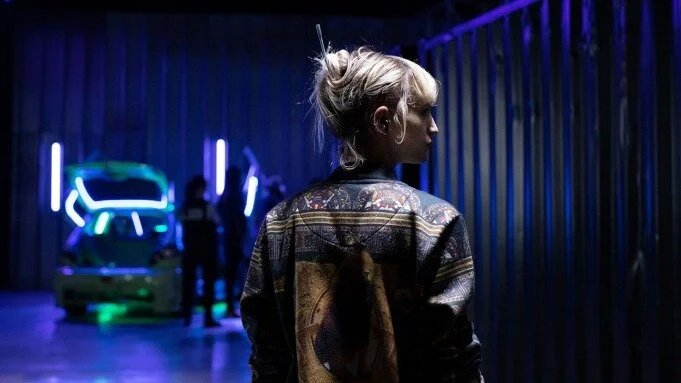Behind the body horror, Titane director Julia Ducournau says her Cannes Palme d'Or winner is all about love
The French filmmaker upends genres as much as ideas about gender
Titane
Titane is now screening at Cineplex Fifth Avenue Cinemas and other venues.
THE RUMOURS ARE true: Titane is about a character who has sex with a car. She’s also a psychokiller whose weapon of choice is the hairstick that holds up her wild platinum mane.
But French writer-director Julia Ducournau is here to tell you that her film is actually about love
At the Cannes Film Festival earlier this summer Ducournau became only the second woman in history to take home the Palme d’Or. Her win came for what the BBC called “the most shocking film of 2021”.
To their point: Titane has a mix of metal, motor oil, blood, and nudity that hasn’t been seen since David Cronenberg’s Crash.
Speaking to Stir via Zoom amid a media frenzy around the movie, Ducournau says she isn’t insulted by suggestions that she’s made an ultraviolet sex thriller, as one headline dubbed it on the day of our interview. It’s just that they’re kind of missing the point.
“Obviously that does not go as far as to talk about the way my film morphs or transforms throughout in order to lead to something that is way more tender and way more loving than that,” says the director, who upended genres in her equally provocative debut feature, 2016’s Raw. “What I’m trying to do is create a new territory and new language that is my own. I’m trying to subvert the codes of different types of film—body horror being obviously the most graphic and obvious one, but I also very much use the grammar of comedy, the grammar of thriller, and the grammar of drama. Drama is very useful when you want to create this kind of ascending movement from darkness to the light and love.”
In Titane, newcomer Agathe Rousselle’s Alexia is a car-show model who has a gigantic scar behind her ear where doctors used titanium (“titane”) to glue her skull together after a childhood highway accident. Following a rampage through her seaside city on a killing spree, she has to go into hiding, disguising herself as the long-missing son of a grieving fireman.
From there Titane morphs from extreme car-fetish sci-fi nightmare to something much more difficult to pin down—a work that’s transgressive and that pushes beyond gender constraints. And those things happen, in the most unexpected ways, in the growing bond between Alexia and her tormented father figure.
“You don’t expect to be moved by something that starts so violently—and yet, for me it makes sense that it can only emerge from a place where you have no humanity,” Ducournau says. “My two characters have to move beyond all the lies and all the violence in order to get to this very unconditional love by the end.”
The filmmaker turns expectations upside down even within single scenes. The most striking example is the crazily audacious, unedited long take near the beginning, where we meet Alexia at a neon-lit car show. The camera tracks behind her as she pushes her way through the mostly male crowd, past writhing female car models, and then circles around to the flame-emblazoned hood of a vintage Cadillac. There, stripped to yellow fishnets and a gold lamé bikini, she humps and grinds away. Sound exploitive? Again, the director says you’re missing the point.
“I knew it had to be done in one shot,” says Ducournau, who cops to writing out every scene in detail, even if, frequently, there’s little to no dialogue. “At first it has to mimic the male gaze that would be focused on all the hostesses, and that would objectify them as much as the cars. That’s why the hostesses have costumes that are metallic, that are laminated: that reminds you of the hoods of the cars.
She continues: “When we get to Alexia, she looks through the camera all the way through her choreography, and she plays with us, she smiles at us, she shows her desire to us—and by doing that she becomes active in the shot. She’s no longer passive. She’s the one gazing at you through the lens, and now it’s her own narrative. It’s not you looking at her. It’s her looking at you.”
We won’t tell you what the character does to one of her more sexually aggressive fans after that.
From this objectified idea of fatal femininity, the preternaturally committed Rousselle transforms into someone less easily categorized, from her horrifically broken nose and shaved head to the fact she’s leaking Pennzoil.
“Femininity and masculinity are a social construct,” the filmmaker begins. “I try to subvert all the representation of the genders and I try to debunk stereotypes. I try to treat the characters equally, and this goes as far as how I try to film their bodies….When you show them as incredibly vulnerable as far as their bodies are concerned, I think it's a place for universal identification.”
As for Alexia: “The more her body transforms, and the less she looks human, the more she humanizes,” Ducournau explains. “So it was always about blurring the boundaries of what we think identity is, or should be, and trying to present a character at the end who is complete—beyond gender and beyond her own skin.”
And there you have it. What may ultimately be the most shocking part about the most shocking film of 2021 is that it’s made by a visionary who dreams of a more inclusive world—one where, no matter how you identify, you sometimes just need a hug. “That goes with creating all forms of character, creating all forms of situations,” she says. “And just trying to put yourself in the shoes of as many people as you can imagine.” Even, obviously, those who ooze motor oil.













